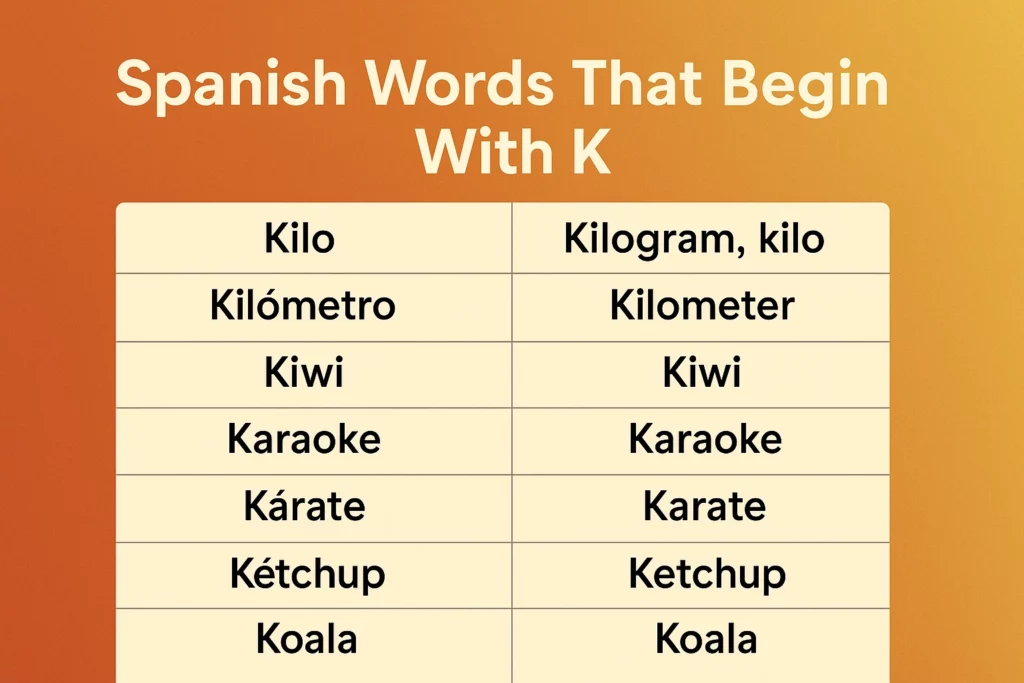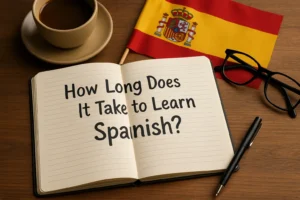
¡Hola amigos! Welcome back to another exciting and unique Spanish-learning journey. Today, we’re exploring an intriguing and somewhat mysterious part of the Spanish language—Spanish words that begin with K.
You might have noticed that words in Spanish that start with a K are pretty rare. The letter K itself is not commonly used in native Spanish words, and most Spanish words with K actually come from other languages, known as loanwords. But don’t let that discourage you!
Understanding and mastering these K words can significantly expand your language skills and impress native speakers. It also makes your vocabulary truly global and versatile, bridging the gap between different cultures and languages.
In this comprehensive guide, I’ll personally guide you through:
- Commonly used Spanish words that begin with K (mostly loanwords).
- Essential nouns, verbs, and adjectives starting with K.
- Unique, intriguing, and rare K words in Spanish.
- Popular names and widely-used loanwords starting with K.
- Answers to common FAQs learners have about the letter K in Spanish.
Ready to unlock the fascinating mystery of the letter K in Spanish? Let’s dive right in and explore these rare but remarkable words together.
Common Spanish Words Starting with K (with English Translations)
As mentioned earlier, native words in Spanish that start with a K are rare, so most Spanish words with K you’ll encounter are loanwords borrowed from other languages. Nevertheless, these words have become popular, widely recognized, and frequently used in everyday Spanish conversations.
Here’s a helpful table with an expanded list of common Spanish words beginning with K, clearly translated into English:
| Spanish Word | English Translation | Word Type/Origin |
| Kilo | Kilogram, kilo | Noun (Measurement) |
| Kilómetro | Kilometer | Noun (Measurement) |
| Kiwi | Kiwi | Noun (Fruit/Animal) |
| Karaoke | Karaoke | Noun (Japanese) |
| Kárate | Karate | Noun (Japanese) |
| Kétchup | Ketchup | Noun (English) |
| Koala | Koala | Noun (Animal) |
| Kayak | Kayak | Noun (Inuit) |
| Kiosco | Kiosk | Noun (Persian) |
| Kimono | Kimono | Noun (Japanese) |
| Kenia | Kenya | Proper Noun (Country) |
| Kebab | Kebab | Noun (Turkish) |
| Kafkiano | Kafkaesque | Adjective (from Kafka, German) |
| Kryptonita | Kryptonite | Noun (Fictional element) |
| Karma | Karma | Noun (Sanskrit) |
Practical Examples to Help You Remember
- Compré un kilo de manzanas. (I bought a kilo of apples.)
- Me encanta el karaoke. (I love karaoke.)
- Mi hijo practica kárate. (My son practices karate.)
- Añade un poco más de kétchup a las papas fritas. (Add a bit more ketchup to the fries.)
- Los koalas viven en Australia. (Koalas live in Australia.)
Quick Pronunciation Tip
Words starting with K in Spanish typically follow the original pronunciation from their language of origin, often making them straightforward and familiar for English speakers.
In the next exciting part, we’ll explore essential nouns starting with K to further deepen your knowledge of these intriguing Spanish words that begin with K.
Suggestion: Speak Spanish Fluently And Fearlessly With These Proven Tips
Essential Spanish Nouns Starting with K (with Examples & Translations)
While native words in Spanish that start with a K are few, the letter K prominently features in borrowed nouns from various languages. These loanwords have seamlessly integrated into everyday Spanish usage, enriching the language with a global touch.
Here’s an expanded, helpful table featuring essential Spanish nouns beginning with K, clearly presented with English translations and easy-to-follow examples:
| Spanish Noun | English Translation | Example Sentence |
| Kilo | Kilo, kilogram | Necesito un kilo de azúcar. (I need a kilo of sugar.) |
| Kilómetro | Kilometer | Quedan cinco kilómetros hasta la ciudad. (There are five kilometers left to the city.) |
| Kiwi | Kiwi | Compré algunos kiwis frescos. (I bought some fresh kiwis.) |
| Kiosco | Kiosk | Compré el periódico en el kiosco. (I bought the newspaper at the kiosk.) |
| Kárate | Karate | Mi hijo tiene clases de kárate. (My son has karate classes.) |
| Koala | Koala | Vi un adorable koala en el zoológico. (I saw an adorable koala at the zoo.) |
| Kétchup | Ketchup | Pásame el kétchup, por favor. (Pass me the ketchup, please.) |
| Kayak | Kayak | Nos encanta remar en kayak. (We love kayaking.) |
| Kimono | Kimono | Ella lleva un hermoso kimono. (She is wearing a beautiful kimono.) |
| Kebab | Kebab | Cenamos un delicioso kebab anoche. (We had a delicious kebab last night.) |
| Kenia | Kenya | Planeamos viajar a Kenia este año. (We plan to travel to Kenya this year.) |
| Kilovatio | Kilowatt | La factura indica el consumo en kilovatios. (The bill indicates consumption in kilowatts.) |
| Kermés | Charity fair, bazaar | Fui a la kermés de la escuela. (I went to the school fair.) |
| Kamikaze | Kamikaze | Ese conductor parecía un kamikaze. (That driver seemed like a kamikaze.) |
| Kryptonita | Kryptonite | Superman teme la kryptonita. (Superman fears kryptonite.) |
Quick Memorization Tip
Visualize scenarios vividly—imagine yourself buying fruit at a “kiosco,” practicing “kárate,” or seeing a “koala.” This technique helps you remember vocabulary effortlessly.
In the next part, we’ll explore essential verbs and adjectives beginning with K, enriching your vocabulary even further!
Spanish Verbs & Adjectives Starting with K (with Examples & Translations)
When exploring Spanish words that begin with K, you’ll find that verbs and adjectives starting with K are extremely rare, mostly consisting of loanwords adapted into everyday Spanish. Despite this rarity, the following carefully curated list will enhance your vocabulary and cultural understanding.
Let’s dive into these intriguing Spanish words with K:
Spanish Verbs Starting with K
Due to the scarcity of native verbs starting with K, Spanish primarily incorporates borrowed verbs from other languages:
| Spanish Verb | English Translation | Example Sentence |
| Kilometrar (rarely used) | To measure in kilometers | Vamos a kilometrar la ruta del viaje. (We will measure the travel route in kilometers.) |
(Note: Verbs beginning with K are extremely rare in Spanish. Most verbs are adaptations or slang.)
Spanish Adjectives Starting with K
Here’s an expanded selection of Spanish adjectives borrowed from other languages, beginning with the letter K:
| Spanish Adjective | English Translation | Example Sentence |
| Kafkiano/a | Kafkaesque (complex, surreal) | Su situación es bastante kafkiana. (His situation is quite Kafkaesque.) |
| Keniata | Kenyan (from Kenya) | Tengo un amigo keniata. (I have a Kenyan friend.) |
| Kuwaití | Kuwaiti (from Kuwait) | Ella es una estudiante kuwaití. (She is a Kuwaiti student.) |
| Káiser | Imperial (related to Kaiser) | Es un estilo muy káiser. (It’s a very imperial style.) |
| Kurdo/a | Kurdish | Comí en un restaurante kurdo ayer. (I ate at a Kurdish restaurant yesterday.) |
Quick Usage Tips
Due to their origins, adjectives and verbs beginning with K often retain their foreign pronunciation and cultural context, making them easily recognizable and distinctive in conversation.
In the next exciting section, we’ll uncover some unique, rare, and interesting Spanish words that begin with K, further enriching your vocabulary.
Related: Wish ‘Happy Birthday’ in Spanish the Right Way Today.
Unique and Rare Spanish Words Beginning with K (Expand Your Vocabulary)
You’ve done an excellent job so far! Now, let’s dive deeper into some truly unique and rare Spanish words that begin with K. While these aren’t frequently used, knowing them can showcase your impressive command of the language and enrich your conversations.
Here’s an expanded, fascinating selection of rare Spanish words with K, complete with translations and example sentences:
| Spanish Word | English Translation | Example Sentence |
| Kermés | Charity fair, festival | Fuimos a la kermés del barrio. (We went to the neighborhood fair.) |
| Kanji | Kanji (Japanese characters) | Estoy aprendiendo kanji. (I’m learning kanji.) |
| Kibutz | Kibbutz (Israeli commune) | Mi amigo vive en un kibutz en Israel. (My friend lives on a kibbutz in Israel.) |
| Kinesiólogo/a | Physiotherapist | Visité al kinesiólogo después del accidente. (I visited the physiotherapist after the accident.) |
| Kimono | Kimono | Ella usó un elegante kimono en la fiesta. (She wore an elegant kimono to the party.) |
| Kefir | Kefir (fermented milk drink) | Tomo kefir para mejorar mi digestión. (I drink kefir to improve my digestion.) |
| Káiser | Kaiser, emperor | En historia estudiamos sobre un famoso káiser alemán. (In history, we studied a famous German kaiser.) |
| Kafkiano/a | Kafkaesque (absurdly complex) | Su burocracia es completamente kafkiana. (Their bureaucracy is completely Kafkaesque.) |
| Koiné | Common dialect (Koine) | La koiné fue un dialecto griego común. (Koine was a common Greek dialect.) |
| Karma | Karma | Él cree firmemente en el karma. (He strongly believes in karma.) |
Quick Vocabulary Challenge
Pick one or two words from the above list and practice using them today. For example: “Ayer disfruté mucho en la kermés.” (Yesterday I enjoyed myself a lot at the fair.)
In our next part, we’ll highlight popular names and widely-used loanwords starting with K, giving you valuable cultural insights and more fascinating vocabulary.
Popular Names and Loanwords Starting with K in Spanish
As native words in Spanish that start with a K are quite rare, Spanish speakers frequently borrow names and words from various languages. This makes the letter K especially interesting—it symbolizes linguistic diversity and cultural openness.
Let’s explore a carefully expanded selection of popular names and widely-used loanwords beginning with K, highlighting their origins and meanings.
You May Also Like: Say “How Are You” In Spanish In Any Situation With Ease.
Popular Spanish Names Starting with K (Male & Female)
| Name | Gender | Origin | Meaning |
| Karina | Female | Scandinavian/Latin | Pure |
| Kevin | Male | Irish | Gentle, handsome |
| Karla | Female | Germanic | Strong |
| Kenia | Female | African | From Kenya |
| Kilian | Male | Irish | Warrior |
| Kiara | Female | Italian/Irish | Bright, clear |
| Katia | Female | Russian | Pure |
| Kimberly | Female | English | Royal fortress |
| Kamil | Male | Arabic | Perfect, complete |
| Kira | Female | Russian/Greek | Lady, ruler |
Popular Loanwords Starting with K in Spanish
| Spanish Word | Origin Language | English Translation | Example Sentence |
| Karaoke | Japanese | Karaoke | Cantamos en el karaoke anoche. (We sang karaoke last night.) |
| Ketchup | English | Ketchup | Añade ketchup a tu hamburguesa. (Add ketchup to your hamburger.) |
| Kayak | Inuit | Kayak | Fuimos en kayak el fin de semana. (We went kayaking this weekend.) |
| Kebab | Turkish | Kebab | Me encanta comer kebab en la calle. (I love eating kebabs on the street.) |
| Karma | Sanskrit | Karma | Él cree en el karma. (He believes in karma.) |
| Kiwi | Maori | Kiwi | Comí un delicioso kiwi esta mañana. (I ate a delicious kiwi this morning.) |
| Kimono | Japanese | Kimono | Ella compró un kimono tradicional. (She bought a traditional kimono.) |
| Ketchup | English | Ketchup | Prefiero papas fritas con ketchup. (I prefer fries with ketchup.) |
| Kárate | Japanese | Karate | Mi primo practica kárate. (My cousin practices karate.) |
| Kiosco | Persian | Kiosk | Compra revistas en el kiosco. (Buy magazines at the kiosk.) |
Quick Cultural Insight
Borrowing words from different languages enhances the Spanish language by adding variety and richness. These borrowed Spanish words with K show just how global and inclusive the language truly is.
Next, we’ll wrap up your learning experience beautifully with helpful FAQs and an inspiring conclusion!
FAQs
Q1: Are there native Spanish words that start with K?
Very few. Most words in Spanish that start with a K are borrowed from other languages like English, Japanese, or Arabic.
Q2: What are some common Spanish words beginning with K?
Common examples include “kilo” (kilo), “kilómetro” (kilometer), “kiwi” (kiwi), “kárate” (karate), and “karaoke” (karaoke).
Q3: Why does Spanish rarely use the letter K?
The Spanish alphabet traditionally relies on the letters “C” and “QU” to produce the “K” sound, making “K” uncommon in native vocabulary.
Q4: Are there Spanish adjectives starting with K?
Yes, though rare. Examples include “kafkiano” (Kafkaesque), “keniata” (Kenyan), and “kurdo” (Kurdish).
Q5: Can you name popular Spanish names starting with K?
Sure! Popular examples include “Karina,” “Kevin,” “Karla,” “Kiara,” and “Kimberly.”
Conclusion
¡Excelente trabajo! (Excellent job!) You’ve successfully navigated the intriguing world of Spanish words that begin with K. Despite their rarity, these K words enrich your vocabulary, helping you connect across cultures and communicate confidently.
Remember, language learning is a continuous, joyful adventure. Keep practicing, stay curious, and proudly use your newly acquired vocabulary.
Thank you for joining me on this fascinating journey! ¡Hasta pronto, y feliz aprendizaje! (See you soon, and happy learning!)



